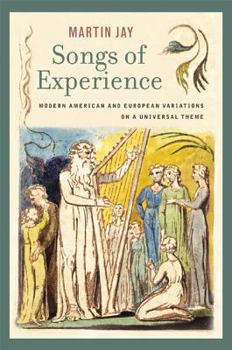Songs of Experience: Modern American and European Variations on a Universal Theme
Select Format
Select Condition 
Book Overview
Few words in both everyday parlance and theoretical discourse have been as rhapsodically defended or as fervently resisted as "experience." Yet, to date, there have been no comprehensive studies of how the concept of experience has evolved over time and why so many thinkers in so many different traditions have been compelled to understand it. Songs of Experience is a remarkable history of Western ideas about the nature of human experience written by one of our best-known intellectual historians. With its sweeping historical reach and lucid comparative analysis--qualities that have made Martin Jay's previous books so distinctive and so successful--Songs of Experience explores Western discourse from the sixteenth century to the present, asking why the concept of experience has been such a magnet for controversy. Resisting any single overarching narrative, Jay discovers themes and patterns that transcend individuals and particular schools of thought and illuminate the entire spectrum of intellectual history.
As he explores the manifold contexts for understanding experience--epistemological, religious, aesthetic, political, and historical--Jay engages an exceptionally broad range of European and American traditions and thinkers from the American pragmatists and British Marxist humanists to the Frankfurt School and the French poststructuralists, and he delves into the thought of individual philosophers as well, including Montaigne, Bacon, Locke, Hume and Kant, Oakeshott, Collingwood, and Ankersmit. Provocative, engaging, erudite, this key work will be an essential source for anyone who joins the ongoing debate about the material, linguistic, cultural, and theoretical meaning of "experience" in modern cultures.
As he explores the manifold contexts for understanding experience--epistemological, religious, aesthetic, political, and historical--Jay engages an exceptionally broad range of European and American traditions and thinkers from the American pragmatists and British Marxist humanists to the Frankfurt School and the French poststructuralists, and he delves into the thought of individual philosophers as well, including Montaigne, Bacon, Locke, Hume and Kant, Oakeshott, Collingwood, and Ankersmit. Provocative, engaging, erudite, this key work will be an essential source for anyone who joins the ongoing debate about the material, linguistic, cultural, and theoretical meaning of "experience" in modern cultures.
Format:Paperback
Language:English
ISBN:B008XZY9JM
ISBN13:9780520248236
Release Date:January 2005
Publisher:University of California Press
Length:441 Pages
Weight:1.38 lbs.
Dimensions:1.1" x 6.0" x 9.0"
Related Subjects
Americas Europe History History & Surveys Ireland Philosophy Politics & Social SciencesCustomer Reviews
1 rating
The Varieties of "Experience" from the Greeks to Foucault
Published by Thriftbooks.com User , 17 years ago
Berkeley historian and critic, Martin Jay, offers a roadmap to trace the many vicissitudes of the idea of "experience" from the Greeks to Foucault. No other book out there does so with the thoroughness and detail for which Jay is justly known. Showing its roots in the Greek stress on reason and its capacities, Jay goes on to describe the humanist appropriation of it in Montaigne (1533-1592), whose holistic concept inevitably splits off into epistemological, religious, aesthetic, political and historical variants. In a novel move, Jay then shows how various 20th-century traditions (dialectical, pragmatist, phenomenological and poststructuralist) all try to reconstitute a more holistic version of the concept with varying degress of success. Or rather, "success," he tells us, is not entirely the right word, for there is no putatively correct version toward which the story leads. Although Jay provides hints sometimes about why a variant of the idea should have taken the form it did, he generally eschews rooting the ideas in the life-experiences of the authors he considers. "Such attempts," he explains, "generally presuppose a given notion of the experience out of which the ideas are alleged to emerge" (5). His whole book is aimed against this presupposition. The book is very rich and fairly luxuriates in the many relevant primary and secondary texts turned up in his research. These are not just window-dressing but themselves play a large role in informing the reader about Jay's statements and judgments of specific authors and the peculiarities of their arguments. The last chapter on poststructuralism may come as a surprise, for it shows how Bataille, Barthes, and Foucault--who are usually taken to be destroyers of the centered self and its unproblematic inner experience--actually push for concepts and practices that yield a somewhat more positive notion of experience. In this new light, Bataille appears as a devotee of a Nietzschean experimental life that is not automatically nihilistic. An admirer of Bataille, the literary critic Roland Barthes offers an image of a desiring body drawn to whatever takes its fancy in spite of the specter of death that haunts his whole "cruising" mentality. Yet another supporter of Bataille, Michel Foucault, combines Bataille, Barthes and Nietzsche to propose a daredevil savant ceaselessly juggling "the subject, truth and the constitution of experience" (394). Although Jay wouldn't endorse Foucault's concept as the latest and thus correct verson, he does admire its combination of the moments contained within it: Bildung, aesthetic self-fashioning, prereflective existence and postreflective reconstruction. It is therefore not surprising that Jay ends his "experience-book" (Foucault's term) (409) with the idea that experience is a constant opening out to the world of the other, or the new, so that you may be transformed. It's a voyage he urges on us all even though we may encounter a shipwreck or two. The





